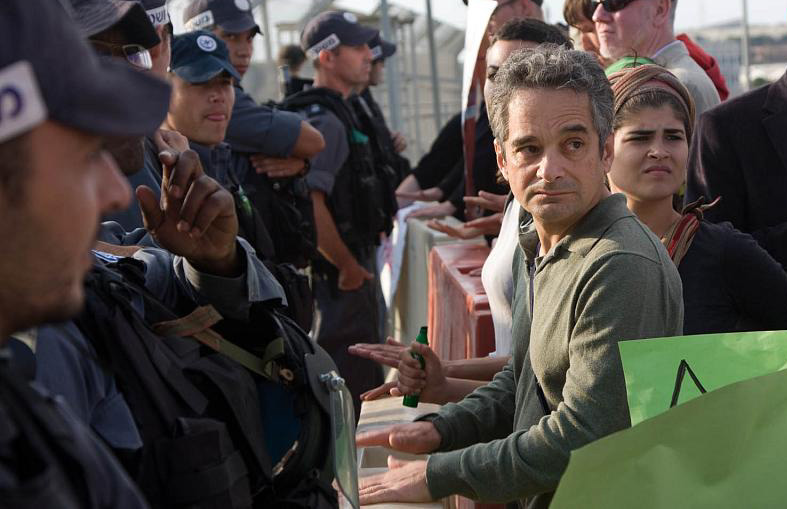Israel’s Erez Crossing to the Gaza Strip
By Tom Suarez, October 26, 2008 (two months and one day before the Cast Lead offensive)
The brief flutter of her eyes away from the soldiers told me that the young Palestinian woman next to me also saw it crawl out from near the guard booth to our left. Large and nearly black, it had stepped onto an asphalt stage whose backdrop happened to be the Erez Crossing to the Gaza Strip.
Had it emerged a short while earlier, it would surely have been unceremoniously trampled by the doctors and academics who, along with a few non-professionals such as me, had swarmed the metal gate in token defiance. We were supposed to have crossed through it today to attend a conference organized by the Gaza Community Mental Health Programme more than a year in advance. Each of us possessed entry documents from the World Health Organization, which along with the European Union, was among the event’s sponsors. But Israel blocked our entry, and so we became another tiny footnote in its hermetic blockade. We could, however, protest in relative safety, unlike the million and a half people trapped inside. Western privilege and the presence of myriad cameras protected us and, for the moment, our Palestinian colleagues.
So protest we did. We held banners and chanted slogans. We tried to talk to the soldiers in the hope of eliciting critical thought. And we made noise. We set upon the metal links, rattling them with such enthusiasm that the soldiers were convinced that we could not possibly sustain the din for long. But when we proved to be as relentless as locust, they dragged out barricades and ordered us behind them. I held fast until two soldiers physically removed me. Several soldiers then positioned themselves in the narrow corridor newly formed between the barricades and the gate to be sure we caused no further mischief.
We might have been left to stand there, defeated and impotent, had we not quickly discovered what effective drums the flat tops of the hollow plastic barricades make. So we laid musical siege once again, pounding our new war drums with flattened palms.
It was then that the cockroach stepped out from the shadows into the mid-afternoon sun, crawling east to west through the forbidden space into a minefield of Israeli Defense Forces boots. And it was then that the irony passed through my mind: how many times had I heard cockroach as the favored pronoun for Palestinians, an efficient two-syllable dehumanization to empower oppression?
The young Palestinian woman next to me saw that I, too, was looking at the fat, oblivious insect. While our hands hammered away on the barricades, our eyes followed it crawling into greater and greater danger, nearer and nearer the soldier glaring directly at her and me.
And then he spotted it.
A moment passed as the soldier watched the insect plod along. Then he bent down to pick it up. I imagined him nabbing a Palestinian untermenchen in his fingers, free to direct or end its life as he pleased, with the same impunity as if it were the young woman next to me or a schoolchild on the other side of the crossing. Like the character in Kafka’s novella, the world had forgotten them.
Why, then, did the soldier coddle the cockroach very gently, as if careful not to cause it harm or even distress? My drummer neighbor and I exchanged suspicious glances. I could conjure only one answer, and so mentally prepared myself to have a huge cockroach catapulted into my face. I resolved not to flinch—yes, that would be my defiance, I would keep pounding away at the barricade drums without missing a beat. Or was it destined for her? Another exchange of glances told me that she was equally prepared.
So it was in utter disbelief that she and I watched as the soldier, cockroach respectfully in hand, turned and walked to the guard booth, knelt down by a shady, sandy patch, and respectfully set the wayward creature free, clear of danger. One of Israel’s most powerful weapons is its juxtaposing itself and Gaza as Good versus Evil, as if its deadly barrier were all that keeps the barbarian hordes from overrunning Civilization. I imagined the entrance before me as the very Caspian Gates, the mythical threshold protecting Humanity from the Biblical monsters Gog and Magog—and yet the soldier had left these apocalyptic Gates in order to deliver the cockroach to safety. His fingers’ mission of charity completed, they slipped back to the metal trigger of his US-supplied weapon, and he walked back into formation to resume his cold fix on us.
My young Palestinian neighbor pulled out a fat green marker that she’d used earlier for making banners, and now banged away with a two-tone protest, her right hand using the marker’s hard end while her left hand persevered with her palm. “If it was us?” she said just loud enough for me to hear over the drone, “he would have shot us.”

